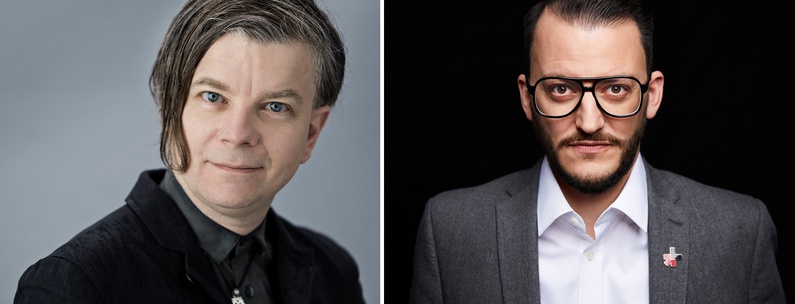
Meet the male feminists of Europe
Published on
Danish blogger and author Henrik Marstal and German digital & diversity consultant and activist Robert Franken have outed themselves as feminists since 2016; fighting for more gender equality via their initiative Male Feminists for Europe, an international platform boycotting all-male panels with #men4equality. We reached out to them in Copenhagen and Cologne for International Women's Day.
cafébabel: Why does Europe need male feminists in 2017?
Henrik: There are already quite a number of male feminists at least in the Nordic countries, where I live. But we need more male feminists because gender equality is an issue which concerns everyone. And since men historically have been the suppressors, they really have some work to do!
Robert: This isn't just a European issue, but you have to start somewhere. We need men to understand that the feminist agenda is something which is in their own interest. The debates are circling around topics which affect men's lives, too: relationships, politics, law, careers, education and much, much more. I believe that feminism is one of the most impactful movements when it comes down to discussing how we want to live and how we want to change our societies for the better. Men should seek an active role in these debates and become change-agents (and activists). Feminism can be a good orientation for doing so.
cafébabel: What do Danish and German men think about women's rights?
Henrik: It is quite mixed. Last year, the World Economic Forum's annual Global Gender Gap Report showed that Denmark had dropped to 19th place in terms of gender equality, whereas the four other Nordic countries - Iceland, Finland, Norway and Sweden - were the top four! That was kind of embarrassing for many Danes. Many men and even male politicians in Denmark today are very aware of the necessity of the gender debate, but among many people "feminism" is still a dirty word, and "male feminists" are considered to be suffering from Stockholm Syndrome.
Robert: I couldn't tell, for there is no clear perspective. At least not just one. Without stereotyping too much, I think that there are at least four groups of men:
A. Men who feel threatened by feminism. They are afraid of ideas of gender balance and haven't really reflected on their roles and perspectives. They quite often lash out when triggered by discussions around gender.
B. Men who are already living the balance. They are naturals when it comes down to equal opportunities and shared responsibilities in the workplace and at home. They don't engage in debates because they don't see the point.
C. Men who choose to remain silent. They are afraid to speak out about "women's issues" because they have seen that things can get pretty rough when they do so.
D. Men who think that we are already living a gender equal society. They don't want to hear anything about gender pay gaps and they switch into attack mode whenever there is a discussion about feminist issues.
 cafébabel: Couldn’t your initiative be interpreted as patriarchal in and of itself - men riding in on white horses to defend women in their name?
cafébabel: Couldn’t your initiative be interpreted as patriarchal in and of itself - men riding in on white horses to defend women in their name?
Henrik: In MFE we really don't "defend women" - women can do that much better themselves. To be a feminist is to be very critical towards patriarchy - that goes for men as well. However, the reproduction of patriarchal values is very hard to get rid of as a man due to social structures embedded in us from an early age. So all men - and women - can act patriarchal from time to time. We hope that this is isn't the case with MFE, though.
Robert: Women don't need us to do defend them. Our goal is to bridge the theoretical (and actual) gap between men and feminism. We want men to be part of the solution, rather than remaining part of the problem. We're not dogmatic and we don't have a strict agenda. We just want to offer a space for men to engage.
cafébabel: Your initiative #men4equality advocates 'mixed' panels, and says men should refuse to speak at male-only panels – what kind of reaction has that gotten?
Henrik: People tend to respect it more and more. Recently, the Danish green party Alternativet (which I am a member of) stated that all of their MEPs would refuse to participate in all-male panels. That is a good start, I think.
Robert: The feedback is mixed. Women usually support our initiative and there are many #men4equality out there who speak out about the cause and who signed the initiative. But there are a lot of event organisers, participants and others who still believe in a meritocratic approach: if there were good female speakers, they would be invited to speak. Unfortunately, things aren't that simple. This is why we have to look behind the parameters of all-male events and panels.
cafébabel: How would you reply to men who say: "I clean, I cook, I care – why should men do more? Where does it stop?"
Henrik: I would reply: "You are doing great, but you should consider the many ways by which male gendered people have suppressed women, and still do. Let Google be your friend and Justin Trudeau your role model."
Robert: Why should it have to stop? It's not about doing some housework or bringing home groceries. It's about an equal approach to living our lives. Men could profit immensely from getting past gender barriers. Their ideas of what it means to "be a man" could unfold in a completely new way. "Natural" roles are very often limiting to our personalities. By overcoming narrow ideas of manhood (and womanhood), we can grow into more than just members of a gender. Instead, the complimentary power of the genders would finally unleash.
cafébabel: Right-wing Polish politician Janusz Korwin-Mikke recently told the European Parliament that "women are smaller, weaker, less intelligent and thus should be paid less." How would you convince him of your position?
Henrik: I would say to him: "Your prejudices are harming everyone, even yourself! They are definitely harming your female family members, your female acquaintances and your female collegaues. How could you?! So here is a suggestion: Why don't you take the time machine back from the 1840's and come to Copenhagen? Then I will take you for a walk and inform you about the modern world."
Robert: Well, I already did reply to him. I wrote something like "What a sad, old man you are" on his Facebook page. This was probably not the most intellectual of comments, but, you know, we can't reply thoroughly to every piece of bullshit out there. Yes, he might be a representative of a not-too-small group of likeminded men - but he still is just a sad figure who is consumed by his own misogyny.
cafébabel: Actress Emma Watson is currently being criticised for showing her body on the front cover of Vanity Fair. Why do we not understand that - in her own words - "you can be a feminist and have boobs"?
Henrik: Because women are still represented by their bodies, whereas men are represented by their faces. And because a women's body in a way does not belong to herself - it belongs to the male gaze. This is one of the most crucial challenges of today, if you ask me. Poor Emma Watson.
Robert: I think the answer she gave speaks for itself: "It's about freedom." She doesn't want to be held hostage by a very narrow and shallow definition of feminism. And I can only emphasize the truth within her reply.
cafébabel: But what do you think about women tweeting photos of Justin Trudeau’s butt?
Henrik: Of course it is sexist, but I can't help seeing it as a kind of ironic meta-commentary to the sexism which women suffer from on a daily basis.
Robert: Are women really doing that? Aren't some men, too? Well, Mr. Trudeau has become quite an icon of male feminism. And we need role models. Obviously, there's also the idea that "sex sells." Again: If someone likes his butt, fair enough. As long he is not reduced to just a single body part, I'm fine with that. But I also see the criticism behind it: If he were a female feminist, would it be acceptable to tweet his butt? Probably not as much.
cafébabel: Women have marched, and will continue to march, all across Europe and the world against Donald Trump and his representation of the return of patriarchal discourse. Did we need this man to show the world that women’s rights are important?
Henrik: No, we did not. But sometimes extreme pressure is the best environment to show your attitude in.
Robert: We didn't need it, but it came as a catalyst. He combines so many disgusting behaviours towards women (and others) that an outcry of that dimension was almost inevitable. If it helps the movement to gain momentum, then I believe it's legitimate to use it. But much more important is our goal: getting rid of misogynists like Trump.
---



